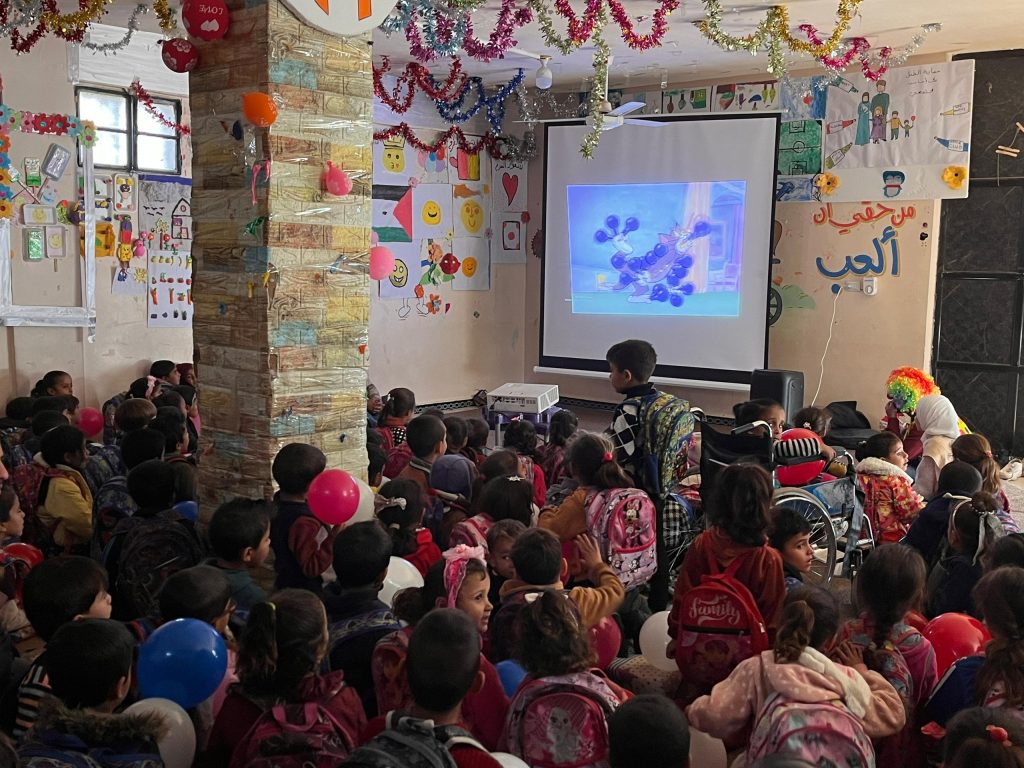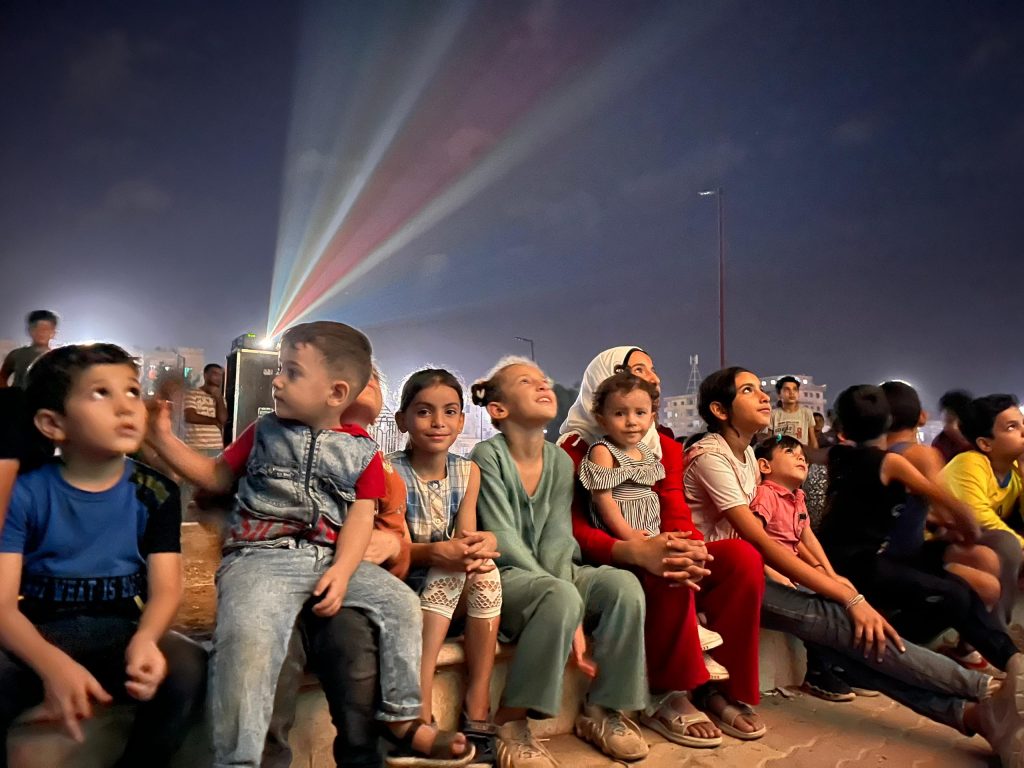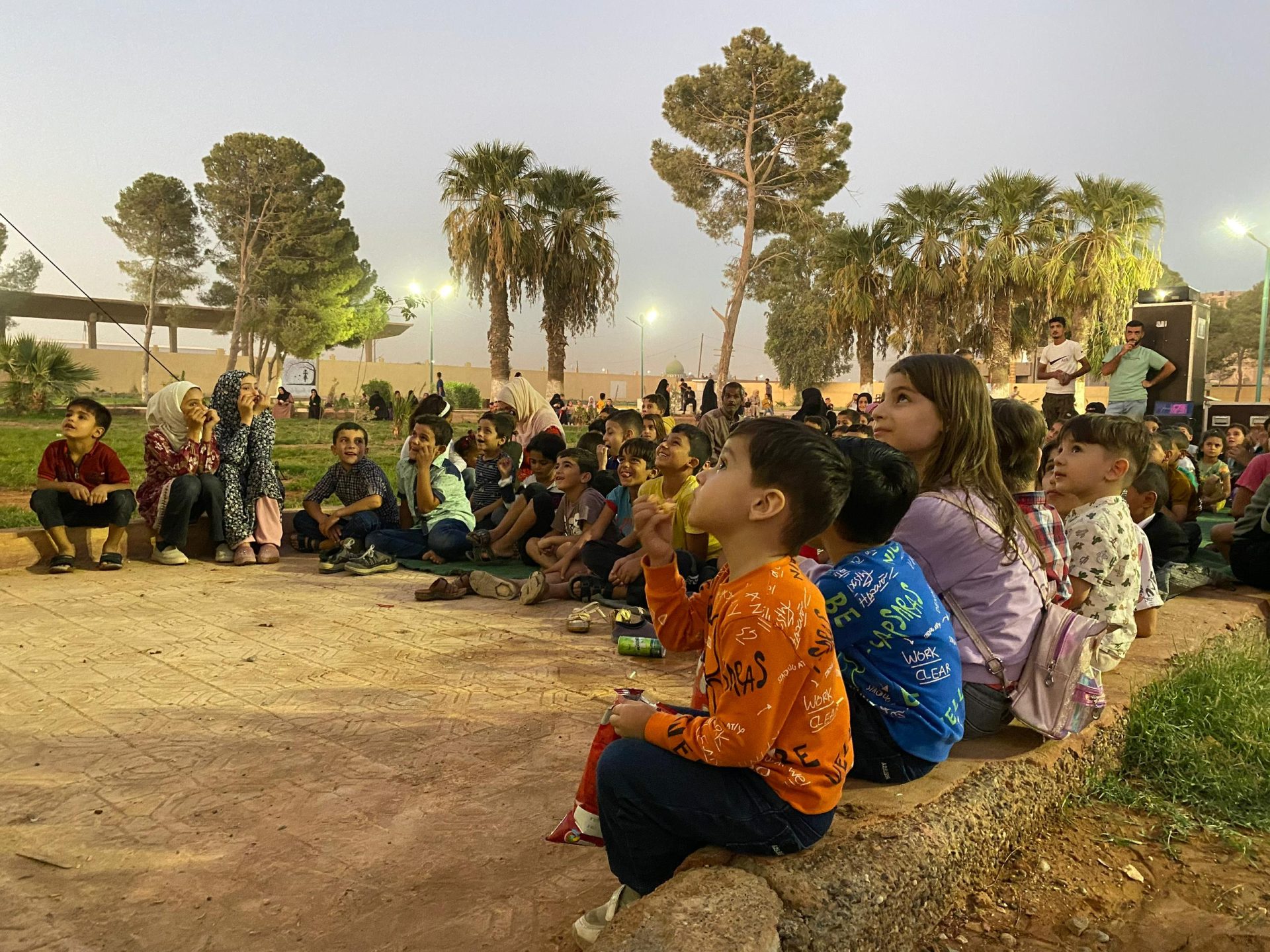A unique and transformative initiative started by the people of Raqqa is helping the city’s children heal and express themselves through the arts.
Written by: Ali Matroud and Alia Fawaz
Raqqa, in north-central Syria, was once known as the nation’s bread basket, with its abundance of crops fed by the nearby Euphrates River. Now, the devastation caused by the war has seen 80% of the area destroyed, as of 2017. Thousands of people lost their homes and were displaced (often more than once). This had a heavy impact on the city’s children—who had their education interrupted, or stopped altogether. While this recent past casts a dark shadow over the children of Raqqa, the future may tell a different story. For now, there is a silver lining, thanks to Screen of Hope—a transformative initiative bringing healing and joy to the children of Raqqa.

Whether watching Aladdin, laughing at Mr Bean or at the pantomimes of Charlie Chaplin on a big screen, all the films shown at Screen of Hope have something in common: they bring much needed respite to the children and take them on a journey of wonder and escapism.
“The films are all dubbed in Arabic, edited and packaged to be suitable,” explains Osama Al Thakhera, the project manager of Screen of Hope’s organising institution Balloon, a non-governmental, non-profit civil society organisation established in 2019. Whether the films are commercial hits or lesser known productions, they have been carefully selected to ensure that the content is meaningful, culturally appropriate and beneficial for the audience.
“The team at Balloon initially wanted to create a project to help their community heal and to find a safe outlet for children and their mothers to come to,” explains Osama. “We had to seek out-of-the-box ideas to restore the life that had been lost over the years. This is where the idea of outdoor cinema emerged. Its goal was to build peace and offer healing through cinema, using it as a tool for peacebuilding and reconstruction.”

In November 2022, Balloon held its first cinema screening in Raqqa and it proved to be an instant success. Soon after, Balloon aligned with the French NGO Les Écrans de la Paix for technical and financial support. Together, they agreed to organise four screenings monthly in four neighbourhoods in Raqqa: Al-Furat, Al-Andalus, Tishrine and Al-Ma’amoun.
Retaj, a nine-year-old boy who had experienced repeated displacement and was eventually ‘settled’ in Adnaniya Camp in Raqqa, was extremely shy and introverted when the Balloon team first met him. His mother took him to attend one of the screenings after growing worried about his wellbeing. “Retaj would sit in a corner alone and not interact with anyone,” recalls Osama. He noticed that the boy observed everything, but kept to himself. It is a similar pattern of many children who first attend, according to Osama. Today, Retaj comes to the screening events with a demeanor of confidence and talks happily to the moderators and other participants.

The films at Screen of Hope events are always shown outdoors and projected onto a large, purpose-built screen. Before the film commences, the children partake in educational games and in group activities such as singing and dancing with the Balloon team. This helps to break the ice and makes the children feel more relaxed and included. There’s also psychological support on-hand for the mothers and children, should they need it.Afterwards, participants are seated to watch the film which typically lasts for about 45-50 minutes. Once it finishes, the team will start a conversation with the children to get their feedback on the film. Osama says this is usually a very animated exchange, with lots of interesting comments and questions from the children.

“They are very curious and eager to know a lot of things. We see a lot of children who are not in any form of formal education. This is why we not only use subtitles but we also add the voiceover in Arabic; this is for the children and mothers who can’t read,” says Osama.
Balloon’s goal is to reach all children and communities affected by conflict with a particular focus on disadvantaged neighbourhoods that are more vulnerable to post-war trauma. This would include the 52 unofficial camps currently in Raqqa. While targeting all the camps would certainly take a lot more time and a bigger budget, for now, Balloon is pleased to have extended Screen of Hope to two refugee camps in Raqqa: Al-Adnaniyah and Sahlat Al-Banat. In the last six months alone, Balloon has managed to screen 92 shows, reaching approximately 10,000 children.
Screen of Hope is testament to how the arts play a crucial role in the recovery and development of conflict-affected communities, by providing a platform for expression, healing and reconciliation. Let’s hope this wonderful mission can continue to grow and put many more smiles on the faces of children throughout Raqqa.



